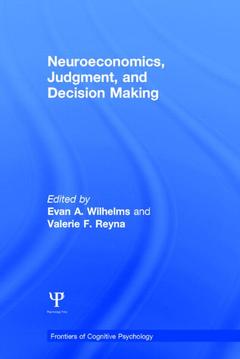Description
Neuroeconomics, Judgment, and Decision Making
Frontiers of Cognitive Psychology Series
Coordinators: Wilhelms Evan A., Reyna Valerie F.
Language: English
Subjects for Neuroeconomics, Judgment, and Decision Making:
Keywords
neuroeconomics; decision making; judgment; cognitive consistency; motivation; fuzzy trace theory; neurobiology; cognitive neuroscience; heuristics; bias; inhibition; hot cognition; dual information processing; individual differences; developmental psychology; Transcranial Direct Current Stimulation; Valerie Reyna; IGT Performance; Risky Choice Behavior; Fluid Cognitive Ability; Ventral Medial Prefrontal Cortex; Mindset Priming; Risky Choice Framing; Cups Task; Psychophysical Numbing; IGT; Gist Representations; Van Duijvenvoorde; Dorsal Medial PFC; Phishing Attacks; Gist Processing; Verbatim Representations; Legitimate Emails; Dual System Models; Universitat Pompeu Fabra; Del Missier; Belief Assessment; Balance Scale Task; Apply Decision Rules; Negative Frame Condition
Publication date: 08-2014
Support: Print on demand
Publication date: 07-2014
Support: Print on demand
Description
/li>Contents
/li>Biography
/li>
This volume explores how and why people make judgments and decisions that have economic consequences, and what the implications are for human well-being. It provides an integrated review of the latest research from many different disciplines, including social, cognitive, and developmental psychology; neuroscience and neurobiology; and economics and business.
The book has six areas of focus: historical foundations; cognitive consistency and inconsistency; heuristics and biases; neuroeconomics and neurobiology; developmental and individual differences; and improving decisions. Throughout, the contributors draw out implications from traditional behavioral research as well as evidence from neuroscience. In recent years, neuroscientific methods have matured, beyond being simply correlational and descriptive, into theoretical prediction and explanation, and this has opened up many new areas of discovery about economic behavior that are reviewed in the book. In the final part, there are applications of the research to cognitive development, individual differences, and the improving of decisions.
The book takes a broad perspective and is written in an accessible way so as to reach a wide audience of advanced students and researchers interested in behavioral economics and related areas. This includes neuroscientists, neuropsychologists, clinicians, psychologists (developmental, social, and cognitive), economists and other social scientists; legal scholars and criminologists; professionals in public health and medicine; educators; evidence-based practitioners; and policy-makers.
Part 1. Historical Foundations. Decision Making by Experts: Influence of Five Key Psychologists, J. Shanteau, W. Edwards. Part 2. Cognitive Consistency and Inconsistency. Cognitive Consistency: Cognitive and Motivational Perspectives, A.S. Chaxel, J. Edward Russo. Fuzzy Trace Theory Explains Paradoxical Dissociations in Affective Forecasting, E.A. Wilhelms, R.A. Setton, R.K. Helm, V.F. Reyna.Part 3.Heuristics and Biases. Intuition, Inhibition, Interference, and Individual Differences in Fuzzy Trace Theory, J.C. Corbin, J.M. Liberali, V.F.Reyna, P.G. Brust-Renck. The Predecisional Distortion of Information, J.E.Russo. The Precision Effect: How Numerical Precision Influences Everyday Judgments, M.Thomas, J. Park.Part 4.Neuroeconomics and Neurobiology. Studying Decision Processes Through Behavioral and Neuroscience Analyses of Framing Effects, I.P. Levin, T. McElroy, G.J. Gaeth, W. Hedgcock, N.L. Denburg, D. Tranel. "Hot" Cognition and Dual Systems: Introduction, Criticisms, and Ways Forward. T.E. Gladwin, B. Figner. Neuroeconomics and Dual Information Processes Underlying Charitable Giving, S.Dickert, D.Västfjäll, P. Slovic.Part 5.Developmental and Individual Differences. Choice from Childhood to Adulthood: Changes in Decision Strategies, Affect, and Control. A.C.K. van Duijvenvoorde, B.R.J. Jansen, H.M. Huizenga. Individual Differences in Decision-making Competence Across the Lifespan, W. Bruine de Bruin, A.M. Parker, B. Fischhoff.Part 6.Improving Decisions. Improving Judgments and Decisions by Experiencing Simulated Outcomes, R.M. Hogarth, E. Soyer. Predictors of Risky Decisions: Improving Judgment and Decision Making Based on Evidence from Phishing Attacks, J.Downs, A. Acquisti, D. Barbagallo
Evan A. Wilhelms is a PhD candidate in the Department of Human Development at Cornell University, and the Laboratory Leader in Dr. Valerie Reyna’s Laboratory for Rational Decision Making. His research is on the topics of judgment and decision making, with implications for financial and health well-being in adolescents and adults. His work has appeared in the Journal of Medicine and Philosophy and Virtual Mentor: American Medical Association Journal of Ethics, as well as several edited volumes.
Valerie F. Reyna is Professor of Human Development and Psychology at Cornell University, Co-Director of the Cornell University Magnetic Resonance Imaging Facility, Co-Director of the Center for Behavioral Economics and Decision Research, and Past President of the Society for Judgment and Decision Making. Her research encompasses human judgment and decision making, numeracy and quantitative reasoning, risk and uncertainty, medical decision making, social judgment, and false memory.
These books may interest you

The Neural Basis of Mentalizing 147.69 €



